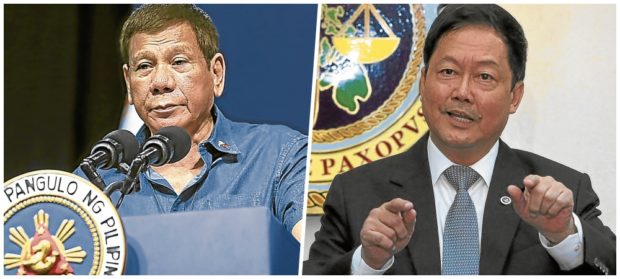Duterte: Gov’t committed to prioritizing human rights
MANILA, Philippines — In a pretaped address on Monday, President Rodrigo Duterte said the country remained committed to making human rights a priority as he pushed for wider cooperation among different sectors to better protect these rights.
Speaking to participants in the first Human Rights Summit 2020, Duterte called the event an “effective platform for the international community to enhance collaboration in the protection and promotion of human rights.”
He said the country was one of the few that had signed many of the core human rights treaties, thus affirming “our serious commitment in honoring and fulfilling our treaty obligations and prioritizing the human rights agenda as a means to achieve our country’s sustainable development goals.”
“Let me, however, stress that our work is far from over. I urge everyone to strengthen the multisectoral engagement that would foster a healthy human rights environment for all,” Duterte said.
His statements were in contrast to his remarks last week that again derided human rights advocates critical of his war on drugs that left thousands dead.
Article continues after this advertisementSince taking office, the President has been at odds with rights organizations, including international groups that he has accused of meddling in the country’s affairs.
Article continues after this advertisementIn a speech in Cavite last week during the destruction of seized narcotics, he accused human rights advocates of being “preoccupied with the health and life of the criminals who are the drug pushers and the drug lords.”
Polluted testimony
“To this day, I say to the human rights, I don’t give a shit with you,” Duterte said.
In his keynote address to the three-day summit, Justice Secretary Menardo Guevarra said the implementation rules of the new antiterrorism law that his department had drawn up guaranteed the protection of people’s civil and political rights.
“These safeguards, among other measures, have been included in the implementing rules to ensure that the antiterrorism law serves its purpose without invading the cherished rights and prerogatives of a people under a functioning democracy,” he added.
According to him, the United Nations has offered technical assistance in promoting programs “to ensure that the antiterrorism rules conform to the fundamental tenets of human rights laws.”
Guevarra, however, noted that the refusal of witnesses to testify was hampering a special interagency body led by the Department of Justice from investigating the killings of political activists and other cases of human rights violations.
In some instances, the testimony of witnesses who surface appears polluted, colored by motivations other than the pursuit of the truth,” he said.
“In many others, witnesses refuse to cooperate altogether. Fear usually forces witnesses into silence. It is no wonder that some of our investigations face a blank wall and not a few cases turn cold,” he said.
